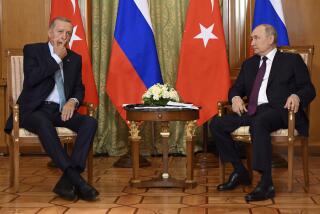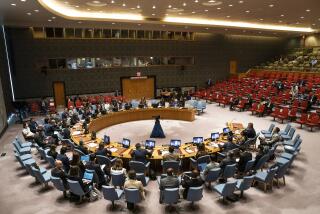U.S.to Press for Large Soviet Grain Contract
- Share via
WASHINGTON — Trade Representative Clayton Yeutter said Wednesday that the United States will press Moscow for large grain-purchase commitments when negotiations for a new grains pact begin in Washington on March 19.
In an interview with Reuters, Ambassador Yeutter said the Reagan Administration would seek the highest grain purchase commitment possible from the Soviet Union. He would not comment on exactly how much grain the United States will ask Moscow to buy.
Yeutter said he did not want to conduct the market-sensitive negotiations publicly, but he added that “clearly the principal concern we have would be in obtaining as large a commitment as we possibly can (from the Soviet Union).”
In 1983 when the long-term grain agreement with Moscow was renegotiated, Washington opened the talks by demanding a minimum annual purchase requirement of 16 million metric tons.
Asked if the United States would seek such a large minimum again this year, Yeutter would not comment.
Problem in 1983 Talks
He did say, however, that the question of the price at which Moscow must buy the grain was “not handled satisfactorily” in the 1983 negotiations and the two sides must reach an understanding on the question.
As interpreted by Moscow, the 1983 agreement provides that the United States must provide the grain at competitive world prices, while the United States says prevailing U.S. prices are competitive.
The current accord calls for the Soviet Union to purchase 9 million tons of American grain and oilseeds annually. The agreement expires Sept 30.
Yeutter noted that he has not typically supported bilateral agreements such as the U.S. long-term grain accord with Moscow, but he added, “this is one agreement that I truly believe ought to be extended.”
He said the accord is useful because of the sensitive nature of trade with the Soviet Union.
In an earlier interview with Reuters, Alexander Ivlev, Soviet representative in the United States for Exportkhleb, Moscow’s grain buying agency, said the Soviet delegation was likely to push for smaller grain purchase guarantees.
Ivlev said Moscow can buy enough grain outside of an agreement and said the Soviets would be hesitant to commit to any long-term grain purchase arrangements.
U.S. analysts forecast that despite the two sides’ different opening positions, a reasonable compromise would be worked out and a new grain pact similar to the current one would be fashioned.
Yeutter, who has overall responsibility for the grain negotiations, said the postponement until March 19 of the opening negotiating session of the grain talks was nothing more than “a routine sort of thing.”
The two sides originally announced that they would meet in Vienna on March 11, but Moscow asked for a few days delay.
More to Read
Sign up for Essential California
The most important California stories and recommendations in your inbox every morning.
You may occasionally receive promotional content from the Los Angeles Times.










